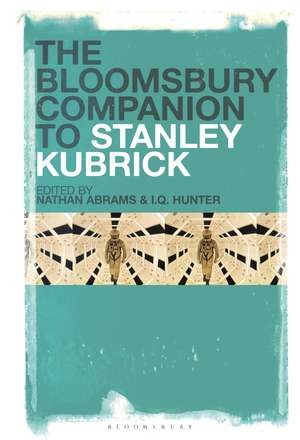The Bloomsbury Companion to Stanley Kubrick
Editat de I. Q. Hunter, Professor Nathan Abramsen Limba Engleză Hardback – 13 ian 2021
| Toate formatele și edițiile | Preț | Express |
|---|---|---|
| Paperback (1) | 201.42 lei 6-8 săpt. | |
| Bloomsbury Publishing – 27 iul 2022 | 201.42 lei 6-8 săpt. | |
| Hardback (1) | 631.49 lei 6-8 săpt. | |
| Bloomsbury Publishing – 13 ian 2021 | 631.49 lei 6-8 săpt. |
Preț: 631.49 lei
Preț vechi: 1114.73 lei
-43% Nou
Puncte Express: 947
Preț estimativ în valută:
120.83€ • 126.50$ • 99.98£
120.83€ • 126.50$ • 99.98£
Carte tipărită la comandă
Livrare economică 05-19 aprilie
Preluare comenzi: 021 569.72.76
Specificații
ISBN-13: 9781501343629
ISBN-10: 1501343629
Pagini: 396
Ilustrații: 23 bw illus
Dimensiuni: 152 x 229 x 31 mm
Greutate: 0.69 kg
Editura: Bloomsbury Publishing
Colecția Bloomsbury Academic
Locul publicării:New York, United States
ISBN-10: 1501343629
Pagini: 396
Ilustrații: 23 bw illus
Dimensiuni: 152 x 229 x 31 mm
Greutate: 0.69 kg
Editura: Bloomsbury Publishing
Colecția Bloomsbury Academic
Locul publicării:New York, United States
Caracteristici
The short, critical, historiographical essays on Kubrick make the Companion the most comprehensive overview of the director
Notă biografică
I.Q. Hunter is Professor of Film Studies at De Montfort University, UK, author of Cult Film as a Guide to Life (Bloomsbury, 2016) and British Trash Cinema (BFI, 2013), editor of British Science Fiction Cinema (1999), and co-editor of 11 other books. He has published widely on popular cinema. Nathan Abrams is Professor of Film Studies at Bangor University, UK, author of Stanley Kubrick: New York Jewish Intellectual (2018), The New Jew in Film (2012), Studying Film (2010) and editor of Hidden in Plain Sight (2017). He is currently working on a book about Eyes Wide Shut.
Cuprins
List of illustrationsNotes on contributorsAcknowledgmentsNathan Abrams (Bangor University, UK) and I.Q. Hunter (De Montfort University, UK)Introduction Part One: IndustryIntroduction Chapter 1: Kubrick and Production James Fenwick (Sheffield Hallam University, UK)Chapter 2: Kubrick and Authorship Rod Munday (Aberystwyth University, UK)Chapter 3: Kubrick and Adaptation Graham Allen (University College Cork, Ireland)Chapter 4: Kubrick and Collaboration Manca Perko (University of East Anglia, UK)Chapter 5: Kubrick and Britain Matthew Melia (Kingston University, UK)Chapter 6: Kubrick and TranslationSerenella Zanotti (Roma Tre University, Italy)Chapter 7: Kubrick and the Critics Gregory Frame (Bangor University, UK)Part Two: Sound and ImageIntroduction Chapter 8: Kubrick and Photography Philippe Mather (University of Regina, Canada)Chapter 9: Kubrick and Framing Robert P. Kolker (University of Maryland, USA)Chapter 10: Kubrick and Formalism Rodney F. Hill (Hofstra University, USA)Chapter 11: Kubrick and Acting Ernesto R. Acevedo-Muñoz (University of Colorado in Boulder, USA)Chapter 12: Kubrick and Art Dijana Metlic (University of Novi Sad, Serbia)Chapter 13: Kubrick and ComposingKate McQuiston (University of Hawai'i at Manoa, USA)Chapter 14: Kubrick and Music Christine Lee Gengaro (Los Angeles City College, USA)Part Three: Gender and IdentityIntroduction Chapter 15: Kubrick and Feminism Karen A. Ritzenhoff (Central Connecticut State University, USA)Chapter 16: Kubrick, Gender, and Sexuality Mick Broderick (Murdoch University, Australia)Chapter 17: Kubrick, Marriage, and Family Joy McEntee (University of Adelaide, Australia)Chapter 18: Kubrick and Jewishness Marat Grinberg (Reed College, USA)Chapter 19: Kubrick and the HolocaustGeoffrey Cocks (Albion College, USA)Part Four: Thematic ApproachesIntroduction Chapter 20: Kubrick, Optimism, and Pessimism Dominic Lash (King's College London, UK)Chapter 21: Kubrick and Philosophy Jerold J. Abrams (Creighton University, USA)Chapter 22: Kubrick and Time Elisa Pezzotta (University of Bergamo, Italy)Chapter 23: Kubrick and Madness Lawrence Ratna (Barnet Enfield and Haringey Mental Health Trust, UK)Chapter 24: Kubrick and PsychoanalysisNathan Abrams (Bangor University, UK) and I.Q. Hunter (De Montfort University, UK)Chapter 25: Kubrick and Childhood Nathan Abrams (Bangor University, UK)Chapter 26: Kubrick and Genre Jeremi Szaniawski (University of Massachusetts, Amherst, USA)Part Five: Researching KubrickIntroduction Chapter 27: Kubrick and the Archive Georgina Orgill and Richard Daniels (University of the Arts London, UK) Chapter 28: Kubrick's Research and ReadingCatriona McAvoy (University of the Arts London, UK)Chapter 29: Kubrick and the Unmade Peter Krämer (De Montfort University, UK) and Filippo Ulivieri (screenwriter, Italy)BibliographyFilmographyIndex
Recenzii
This Companion stands out as one of the most substantial overviews of "Kubrick Studies" currently available. For students new to his work, it provides a wide-ranging introduction to Kubrick, employing a comprehensive array of film studies methods-from aesthetics, adaptation studies, and auteur analysis, to identity politics, industry analysis, and archival research. Just as importantly, contributors offer groundbreaking re-evaluations of Kubrick's films and reputation. An indispensable volume.
